
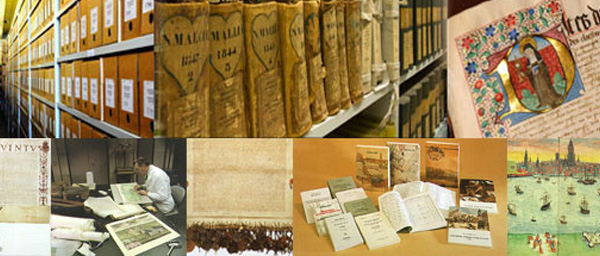
In 2007, the State Archives launched the Demogen-project. A digital platform was set up to make the data of various deeds available to the public and to facilitate their consultation.
Genealogical sources contain millions of personal data. In the past, many individual researchers have systematically analysed the records, noting names and dates. The State Archives provides a platform to make all these further analyses available in one large database. This search engine 'search for persons' wants to offer one central access to all available analyses of records (parish registers, registers of civil status, notary acts, etc.).
The State Archives also want to participate actively in analysis projects. This is possible through the online analysis project 'Demogen visu'. Through Demogen Visu, you can help code the data from the deeds. Interested parties can register via the website of the State Archives. After installing a small software package, they can download digitised documents for editing. The demogen visu package is an integrated package where one can consult the digitised documents at the top of the screen and enter the data in the lower part. The software package contains many tools to facilitate input: automatic translation of Republican date into Gregorian calendar, abbreviated input of municipal names, etc. During editing, the user does not need to be on-line. He/she only needs to have an Internet connection for downloading the work package and re-uploading the database.
More information is available on the State Archives website ![]() (in NL and FR), to participate you can register through the Demogen Visu website
(in NL and FR), to participate you can register through the Demogen Visu website ![]() (in NL and FR).
(in NL and FR).
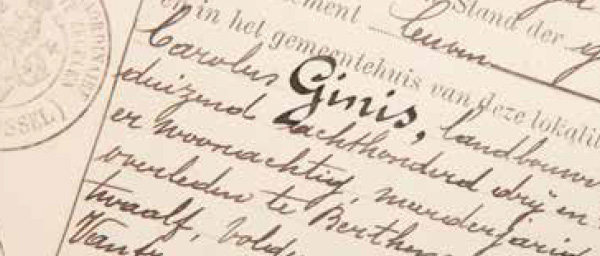
In 2007, the volunteer project DEMOGEN (a combination of 'demography' and 'genealogy') was initiated by the Leuven State Archives and the “Family and Population Studies” research group of the KU Leuven (inspired by a similar initiative from the Bruges State Archives). Initially, the aim was to open up all 19th-century and early 20th-century marriage certificates from the province of Flemish Brabant and the Brussels Capital Region (1800-1910). At the completion of this first section in June 2020, almost 7 million person entries, from about 600 000 marriage and divorce certificates had been entered by more than 150 volunteers. Meanwhile, the project was extended to birth certificates. Currently, the count for the birth certificates sub-project stands at 1 545 658 person entries from 310 975 certificates. And these impressive statistics are growing steadily every day.
The gathered data are available in an online search engine of the State Archives and are very trustworthy. People from Flemish Brabant and the Brussels region can use this databank to learn more about their family tree. Furthermore, analysing these data in a more general framework, makes it possible to learn more about societal structures, cultural processes and economic developments. Over the past decade, KU Leuven's Family and Population Studies research group published many articles and reports using data from the West Flanders and Flemish Brabant volunteer projects. Other research projects also made use of this data collection.
Participation in the project is possible both physically in the reading room of the State Archives in Leuven, or online after a short, physical training in the State Archives. By participating in this project, the volunteer gains experience and learns a lot about the lives previous generations. It is therefore an enriching experience!
More information about DEMOGEN is available on the website of the State Archives (in NL ![]() and FR
and FR ![]() ) and in the article “DEMOGEN: Le crowdsourcing, la généalogie et la démographie historique aux Archives de l’État - Genealogie en historisch-demografisch onderzoek in het Rijksarchief” (in NL
) and in the article “DEMOGEN: Le crowdsourcing, la généalogie et la démographie historique aux Archives de l’État - Genealogie en historisch-demografisch onderzoek in het Rijksarchief” (in NL ![]() and FR
and FR ![]() ). If you have any questions or want to participate, you can contact the State Archives in Leuven
). If you have any questions or want to participate, you can contact the State Archives in Leuven ![]() .
.
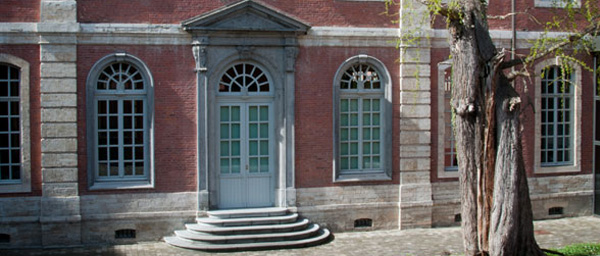
Notaries are frequent writers. They provide written records of important moments in our lives: marriages and divorces, the purchase of the family home, inheritances, etc. Afterwards, we are given a deed that guarantees our rights, but the notary also keeps minutes of the documents he drafts. This way, there is always a backup available, which is crucial in terms of legal certainty for citizens. According to the Notary Act, notaries must transfer their minutes to the National Archives after 75 years, which provides a particularly rich collection. In addition, the State Archives hold a large collection of notarial records from the early modern period. All in all, for the Leuven State Archives alone, this involves almost two linear kilometres of archives.
The registers of notary minutes are only described in general terms in the inventories of the State Archives, indicating the name of the notary and the chronological range of the documents. Within the NOTARIUS project, volunteers are unlocking this mountain of information in much greater detail, allowing genealogists and other researchers to consult this source material in a much more focused way in the future. The Notarius volunteer project aims at a general disclosure with the following main fields: date, type of record and names of the main parties. In the database created, special attention is paid to place and personal names. Since the start of the project in 2015, the counter already stands at over 45 000 entered deeds. Who knows, one day, thanks to this data, you might find deeds in the search environment of the National Archives that bring your own family history or the history of your village to life! More information is available on the State Archives website (in NL ![]() and FR
and FR ![]() ). Participating in the NOTARIUS project is possible both physically in the reading room of the State Archives in Leuven, or online after a short training in the State Archives. If you are interested, you can contact the State Archives in Leuven
). Participating in the NOTARIUS project is possible both physically in the reading room of the State Archives in Leuven, or online after a short training in the State Archives. If you are interested, you can contact the State Archives in Leuven ![]() . If you are interested but not active in the Leuven region, you can contact the State Archives in other regions in Flanders
. If you are interested but not active in the Leuven region, you can contact the State Archives in other regions in Flanders ![]() .
.
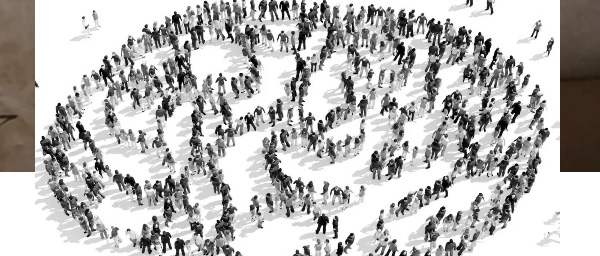
The aim of the PARDONS-project is to open the State Archives’ collection of early modern pardon files through a database. Transcriptions of the documents make it possible to search for stories in these rich sources. Volunteers make the transcriptions which are used to train a robust AI text recognition model and this model is then used to automatically transcribe hundreds of other pardon letters. The State Archives are coordinating this Citizen Science part of the project. Together with Histories vzw, a group of 50 volunteers with knowledge of or interest in paleaography and historical documents was formed. These are often “erfgoedvrijwilligers” (ENG: heritage volunteers) who already have experience with genealogy and/or local history, whether through a local history society or not. With the aid of these volunteers, more than 1500 pages of 16th- and 17th-century pardon letters have been described already that can be used as “ground truth” for the AI text recognition model. Through the PARDONS-project, many volunteers have learned palaeography and/or further developed their skills, obtained knowledge on the subject of “pardons” and gained insight into the processes of archival and historical research. Some volunteers even meet outside the project in informal palaeography working groups.
More information on this project can be found on the PARDONS ![]() website, State Archives website (in NL
website, State Archives website (in NL ![]() and FR
and FR ![]() ) and BELSPO
) and BELSPO ![]() website.
website.
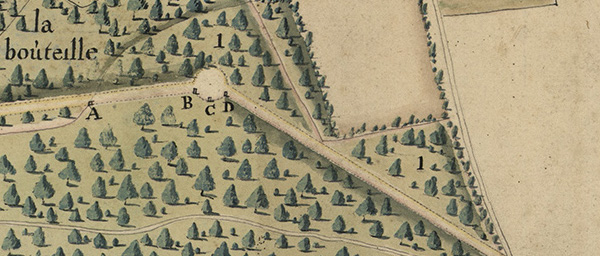
The aim of the DigHimapper project is to process historical maps into analysable sources of information. To do this, the public is involved in two important steps: georeferencing and annotation. Via 'georeferencing', historical maps are placed as closely as possible to their current equivalents. Via 'annotation', toponyms on historical maps are converted into text that can be read by computers. This makes it possible to visualise landscape evolutions and search maps for place names.
As a volunteer, you can participate in this project by refining existing georeferences or by working on toponyms! The results will be used for scientific research on past landscapes, to make digital historical maps better available and as a test case to expand the platform with more functions and a multitude of historical maps.
Visit the DigHimapper website ![]() and start right away!
and start right away!
More information is also available on the State Archives website (in NL ![]() and FR
and FR ![]() ).
).
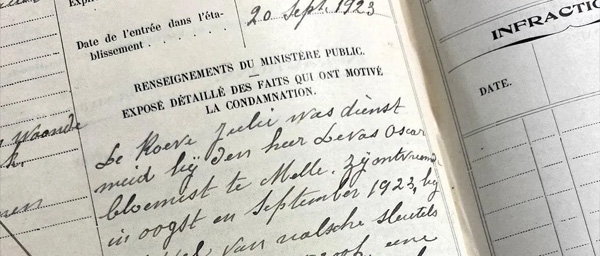
The OUTLAW project has four main objectives: creating an online research and valorisation portal on Belgian prison archives, digitalising the “moral accounting” of Belgian prisons, transcribing and database entry of the convicts’ data and finally, conducting PhD research on the impact of social vulnerability in Belgian criminal justice practice.
The project, financed by BELSPO, is a collaboration between the State Archives, UGent and Histories vzw, but can count on the help of numerous volunteers as well! The volunteers transcribe the name, first name, civil status, occupation and when people arrived in prison. But of course, you also decipher juicy information about the crimes people were convicted of and how they behaved during their prison stay. In short, you get a fascinating insight into the historical underbelly of Belgian society.
More information is available on the BELSPO website ![]() , the State Archives website (in NL
, the State Archives website (in NL ![]() and FR
and FR ![]() ) and the OUTLAW website (in NL
) and the OUTLAW website (in NL ![]() and FR
and FR ![]() ). More specifically, information on volunteering is available as well (in NL
). More specifically, information on volunteering is available as well (in NL ![]() and FR
and FR ![]() ). If you are interested in a sneak peak behind the scenes, you can follow @outlawtales
). If you are interested in a sneak peak behind the scenes, you can follow @outlawtales ![]() on Instagram.
on Instagram.
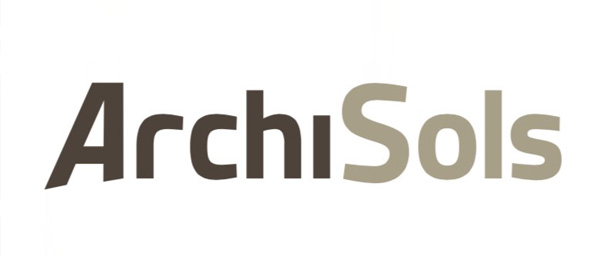
The ArchiSols project aims to improve soil use based on knowledge of the soil. Soil contamination in urban areas is much more widespread than the tools available to citizens and stakeholders suggest. In the case of zoning change, the final blow often comes when all decisions have already been planned: it is discovered that the soil is contaminated! This is followed by a series of disappointments and fears, risks and costs for actors. In Brussels, most of the contaminated soil is excavated and relocated; subsequent opportunities for outdoor horticulture are reduced to zero. Yet "urban agriculture" has been encouraged by the government for several years (Good Food). Just as a better use of industrial wasteland can reduce the phenomenon of soil sealing, a better knowledge of the history of space can contribute to the greening of cities and thus to the fight against global warming.
This project is a collaboration with Innoviris ![]() , in the frame of their “Co-creation projects”
, in the frame of their “Co-creation projects” ![]() . Co-Creation starts from the premise that production of knowledge is not just the task of academic researchers or centres of expertise. The projects integrate different types of knowledge and expertise, from a multitude of actors. Besides scientific expertise, they also recognise "lived" experience, experience from a particular practice or field, institutional expertise, etc. All these different perspectives contribute to the construction of new knowledge.
. Co-Creation starts from the premise that production of knowledge is not just the task of academic researchers or centres of expertise. The projects integrate different types of knowledge and expertise, from a multitude of actors. Besides scientific expertise, they also recognise "lived" experience, experience from a particular practice or field, institutional expertise, etc. All these different perspectives contribute to the construction of new knowledge.
More information is available on the website of the State Archives (in NL ![]() and FR
and FR ![]() ) and the project website (in NL
) and the project website (in NL ![]() and FR
and FR ![]() ).
).
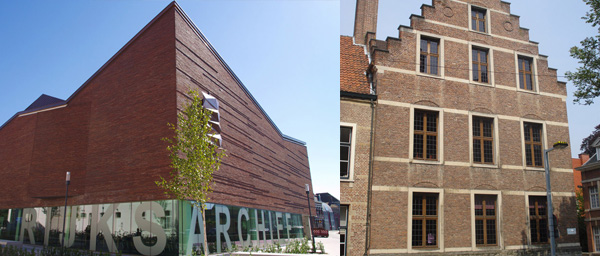
The “West-Vlaamse Akten” (West-Flemish deeds) project has been running at the State Archives in Bruges ![]() since 1999. Over the years, many dozens of volunteers have worked on it, including volunteers from the State Archives in Kortrijk
since 1999. Over the years, many dozens of volunteers have worked on it, including volunteers from the State Archives in Kortrijk ![]() and other city archives. Currently, more than 50 volunteers are active in the project. The original intention was to repertory and dissect in a database all 19th-century marriage certificates from West Flanders. Over time, the project got quite "out of hand".
and other city archives. Currently, more than 50 volunteers are active in the project. The original intention was to repertory and dissect in a database all 19th-century marriage certificates from West Flanders. Over time, the project got quite "out of hand".
The database “Burgelijke Stand, civil status” (BS)-marriages West Flanders got its logical counterparts with databases on BS-births and BS-deaths, and databases containing records of baptisms, marriages and burials from the parish registers of the province. Data from inheritance returns, states of property and orphanage registers also appeared in separate databases.
More information is available on the State Archives website (in NL ![]() and FR
and FR ![]() ).
).

CegeSoma is the fourth operational direction of the State Archives and the Belgian centre of expertise for the history of 20th century conflicts. We conduct fundamental historical research, develop public history projects, conserve archives and documentation and are engaged in societal debate.
A dynamic and diverse team of volunteers helps CegeSoma with their work. The volunteers do a precious work in the filing of documents and archives and in creating inventories of our collections (that mostly cover Belgian history between 1914 and the 1970s, with a focus on both World Wars).
If you have a keen interest in the careful filing of archives, press clippings and photographs and you have some spare time, visit the CegeSoma website ![]() for more information and contact details to participate as a volunteer!
for more information and contact details to participate as a volunteer!
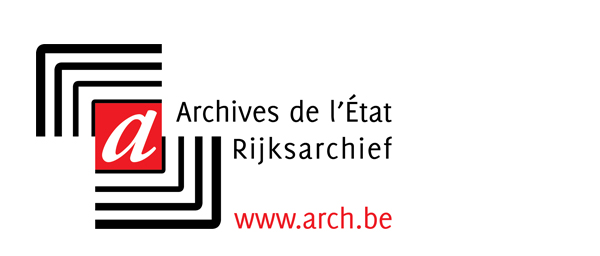
Are you interested in participating in a Citizen Science project, or do you want to engage in another type of volunteering work in the institution? You can contact the project coordinators or local offices where you would like to do volunteering work. You can find an overview of ongoing projects below.
Moreover, there are many more possibilities to do volunteering work at the State Archives (beyond the proposed projects below).
Visit the State Archives website ![]() for more information on becoming a volunteer. Furthermore, you can find the contact details of the different reading rooms through this link
for more information on becoming a volunteer. Furthermore, you can find the contact details of the different reading rooms through this link ![]() .
.
If you are interested in the functioning of the State Archives, you can follow their Facebook page (in NL ![]() and FR
and FR ![]() ) or their YouTube channel
) or their YouTube channel ![]() !
!
1 Important: this overview of project is not exhaustive. There are many local and small-scale Citizen-Science initiatives within the State Archives.